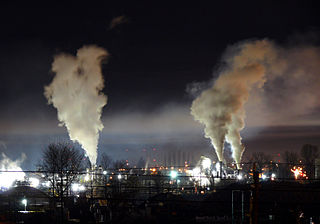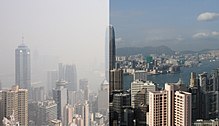Dr. Sarah Mary Liao Sau-tung, GBS, MBE, JP, FRSC was former Secretary for the Environment, Transport and Works of the Hong Kong Special Administrative Region and a member of the Executive Council of Hong Kong since 2002. She was appointed on 1 August 2002 and served until 2007. She is also a Senior Adviser to the Vice-Chancellor of the University of Hong Kong on Environmental and Sustainability Matters.

An air quality index (AQI) is an indicator developed by government agencies to communicate to the public how polluted the air currently is or how polluted it is forecast to become. As air pollution levels rise, so does the AQI, along with the associated public health risk. Children, the elderly and individuals with respiratory or cardiovascular problems are typically the first groups affected by poor air quality. When the AQI is high, governmental bodies generally encourage people to reduce physical activity outdoors, or even avoid going out altogether. When wildfires result in a high AQI, the use of a mask outdoors and an air purifier indoors are also encouraged.
Sir Percy Cradock was a British diplomat, civil servant and sinologist who served as British Ambassador to the People's Republic of China from 1978 to 1983, playing a significant role in the Sino-British negotiations which led up to the signing of the Sino-British Joint Declaration in 1984.

The Marine Department of the Hong Kong Government is responsible for maintaining safety and environmental protection of the harbour, ships registered/foreign ships in Hong Kong and monitor shipping traffic in Hong Kong waters, search and rescue operations for large waters of the South China Sea.

North Lantau New Town is the newest of the nine new towns in Hong Kong, a special administrative region of China, located on the northern coast of the Lantau Island in the New Territories. It covers Tung Chung, Tai Ho Wan, Siu Ho Wan, other parts of northeast Lantau Island, and the reclaimed land along the coast between them. It is the only new town in the Islands District and the youngest new town in Hong Kong. As the commercial, residential and community facilities in the New Town are concentrated in Tung Chung, it has been renamed Tung Chung New Town in recent official government documents.
Lights Out Hong Kong is a campaign in Hong Kong to protest against the city's light pollution. Organisers of the campaign urged people in Hong Kong to switch off their lights for 3 minutes at 8pm on 8th August 2006 as a statement of protest. Campaign organisers hope that the campaign will raise awareness for the issue of air pollution in Hong Kong and urge the government to take action against it. The campaign has gained support from a number of green groups and corporations, and the music duo At17 has volunteered to promote it.

The Air Pollution Index is a simple and generalized way to describe the air quality, which is used in Malaysia. It is calculated from several sets of air pollution data and was formerly used in mainland China and Hong Kong. In mainland China the API was replaced by an updated air quality index in early 2012 and on 30 December 2013 Hong Kong moved to a health based index.
Clear The Air is a voluntary organisation aiming at reducing air pollution in Hong Kong. It was founded on 10 December 1997 as a Society under the Societies Ordinance. It is self-sustained and is supported by individual membership fees and member donations.

Sir Donald Collin Cumyn Luddington, was a British colonial government official and civil servant who served firstly in the Hong Kong Government and became District Commissioner, New Territories and the Secretary for Home Affairs successively, during which he had also served as an official member of the Legislative Council. He was later promoted to Oceania and was High Commissioner for the Western Pacific and Governor of the Solomon Islands during the period from 1973 to 1976. He returned to Hong Kong in 1977 to replace Sir Ronald Holmes as chairman of the Public Service Commission. He was the second person, after Sir Jack Cater, to hold the post of Commissioner of ICAC from 1978 until his retirement in 1980.
Clean Air Network is an independent non-governmental organisation exclusively focused on the issue of air pollution in Hong Kong. CAN aims to educate the public about the health impacts of air pollution and to mobilise public support for cleaner air in Hong Kong. According to Civic Exchange's environmental program director Mike Kilburn, CAN was created with the purpose of encouraging the public to speak out and support government measures that could improve the quality of air in Hong Kong.

Tai Hom Village was the largest squatter village in Kowloon, Hong Kong. Its demolition was completed in 2001, with a few structures of historical value being preserved. The name is still used to designate its former site in Wong Tai Sin District, which is awaiting redevelopment.

Air pollution is the release of pollutants into the air that are detrimental to human health and the Earth. In Canada, air pollution is regulated by standards set by the Canadian Council of Ministers of the Environment (CCME), an inter-governmental body of federal, provincial and territorial Ministers responsible for the environment. Air pollution from the United States and to lesser extent Canada; caused by metal smelting, coal-burning for utilities, and vehicle emissions has resulted in acid rain, has severely impacted Canadian waterways, forest growth, and agricultural productivity.

Princess and the Seven Kung Fu Masters is a 2013 Hong Kong martial arts comedy film directed by Wong Jing.

The Bounty is a 2012 action comedy film featuring the directorial debut of Fung Chi Keung and starring Chapman To, Fiona Sit and Alex Man. In November, the film received the Hong Kong Film Development Fund's "Film Development Foundation Film Production Finance Project" to provide HK$2,605,711 of finance. This is the 13th film financed by The Hong Kong Film Development Fund.
Dai pai dong is a type of traditional food stall in Hong Kong. It was popular in Hong Kong during the 1960s and 1970s. The literal meaning of dai pai dong in English is “big license stall”. The characteristics of dai pai dong are a lack of air-conditioners, unclean environment, and various kinds of food. Starting from 1980s, the government stopped issuing new licenses and began buying them back. Due to its hygienic problem and the deaths of the license holders,most dai pai dong closed down and were replaced by different kinds of restaurants. Urban development has also had an impact on dai pai dong. There are only 25 dai pai dong left in Hong Kong according to the Food and Environmental Hygiene Department, which manages the licenses. Because of the desire to preserver the local food culture, it has been suggested that licenses should be issued again for new and existing dai pai dong owners.
The Hong Kong 2030: Planning Vision and Strategy is a study group tasked with preparing a strategic land use planning framework for Hong Kong up to year 2030. The HK2030 Study aimed to provide strategic framework for future land use in New Territories to address long-term housing demands in the New Development Areas (NDAs) of Kwu Tung North (KTN) and Fanling North (FLN). In 2008 “The North East New Development Areas Planning and Engineering Study” began; it continued until 2013.

The adoption of electric vehicles in Hong Kong is actively supported by the Hong Kong government, which recognizes battery electric vehicles, plug-in hybrids, and conventional hybrid electric vehicles to be environmentally friendly and eligible for financial incentives. As of 31 October 2017, there were 11,039 electric vehicles in Hong Kong, up from less than 100 in 2010. At present, 73 EV models from eight countries have been approved by the Transport Department to be eligible for the incentives. These include 51 models for private cars and motorcycles and 22 models for public transport and commercial vehicles.

The Tuen Mun Public Library is a public library located at 1 Tuen Hi Road, Tuen Mun, Hong Kong.
Public housing estates in Hong Kong are the most common kind of public housing in Hong Kong. Typically, estate units are leased to low-income people. There are three organizations that provide housing units. They are Hong Kong Housing Authority (HKHA), Hong Kong Housing Society (HKHS), and Hong Kong Settlers Housing Corporation Limited.

Environment and Ecology Bureau is one of the fifteen policy bureau of the Government of Hong Kong. The agency was established on 1 July 2022. The current Secretary for Environment and Ecology is Tse Chin-wan.














